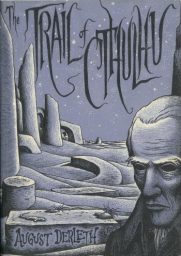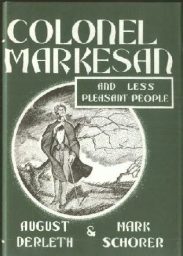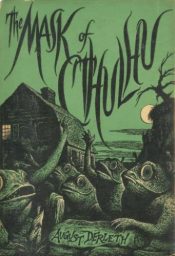 August Derleth was a member of the Lovecraft circle from the late 1920s until Lovecraft’s death. He was also one of the first to make use of the Cthulhu Mythos (with Lovecraft’s blessing). He remains controversial among Lovecraftians for his handling of Lovecraft’s legacy and especially for his Mythos fiction.
August Derleth was a member of the Lovecraft circle from the late 1920s until Lovecraft’s death. He was also one of the first to make use of the Cthulhu Mythos (with Lovecraft’s blessing). He remains controversial among Lovecraftians for his handling of Lovecraft’s legacy and especially for his Mythos fiction.
A review of Derleth’s Mythos fiction on the heels of rereading the core of the Lovecraft catalog put things in perspective for me.
I have been reading Derleth’s Mythos books and his “posthumous collaborations” with Lovecraft the past year. I also read some of this earliest Mythos fiction this week.
John Haefele had this to say in The Derleth Mythos:
“Derleth’s association with the renowned New York publisher Charles Scribner’s Sons, inaugurated in 1935, would last eleven years. He worked with celebrated American Editor Maxwell Perkins, who before Derleth had famously guided F. Scott Fitzgerald, Ernest Hemingway and Thomas Wolfe. Derleth was awarded a Guggenheim Fellowship during this period–simply put, Derleth’s literary status was much greater than any other writer in the Weird Tales circle, exceeded today perhaps only by Lovecraft and Robert E. Howard.”
August Derleth had three parallel writing paths going on in the 1930s: mainstream regional fiction, his Solar Pons series, a Sherlock Holmes pastiche, and weird fiction.
August Derleth was a good, sometimes great writer. There is a smoothness present, especially in his mainstream fiction that makes for a pleasurable experience.
He wrote some early Mythos stories in the early 1930s that John Haefele calls a juvenilia phase. “The Thing that Walked Upon the Wind,” “The Horror from the Depths,” “The  Lair of the Star-Spawn,” “Spawn of the Maelstrom,” and “The Return of Hastur.”
Lair of the Star-Spawn,” “Spawn of the Maelstrom,” and “The Return of Hastur.”
Derleth added some later stories in the early 1940s with “The Dweller in Darkness,” “Ithaqua,” “The Passing of Eric Holm,” and “The Sandwin Compact.”
These are interesting stories. Some have Wisconsin or Canadian settings. Derleth added Zhar, Lloigar, and Ithaqua to the Elder Gods pantheon. The earlier stories are written in a style more natural to Derleth instead of slavish Lovecraft imitation. “Lair of the Star-Spawn” has some blood and thunder present with the main character blazing away with a pistol against the Mi-Go tribesmen in Burma. That story was co-written with Mark Schorer. I don’t know if the Schorer part of the team added the bare fisted element or not.
These earlier Derleth Mythos stories compare favorably to the Mythos fiction written by Smith, Howard, Long, or Bloch at this time.
Derleth wrote a series of Cthulhu Mythos stories that originally appeared in Weird Tales in the 1940s that would later be collected as The Mask of Cthulhu and The Trail of Cthulhu.
One group of stories went on to make up The Trail of Cthulhu. The recurring character of Laban Shrewsbury acts as a sort of Sherlock Holmes/Nayland Smith with a supporting cast. The stories owe more to Sax Rohmer in execution than H. P. Lovecraft. Each novelette has a conspiracy. The main villains are the Deep Ones. Derleth transformed them more into toad or frog men than Lovecraft’s fish-men. The last story “The Black Island” has R’yleh nuked with an atomic bomb to prevent Cthulhu’s ascension. The Mask of Cthulhu is a collection of Derleth pastiches of Lovecraft. Derleth set his stories in Arkham and surrounding environs. The writing includes references to gambrel roofs and plots including cursed inheritances. A great deal was lost when Derleth ceased to be Derleth and tried to be Lovecraft.
The stories move along fine enough but there is none of Lovecraft’s paranoia, sense of decay, and general idiosyncrasy. You read these stories and remember little about them a few weeks later. The sense of the cosmic present with Lovecraft is missing with Derleth. That is probably why he stuck to the more earthly Deep Ones instead of space sea food.
There is some irony as in the 1940s, C. Hall Thompson had four stories in Weird Tales that are better pastiches of Lovecraft than what Derleth was producing. Derleth scared off or threatened Thompson, which is a shame. Thompson went on to write a number of stories for the western pulp magazines, a few stories for Adventure, and good enough to crack Esquire at least twice. I would have liked to read more Thompson weird stories.

Best Arkham House cover ever!
Derleth’s Mythos stories are scattered in the various Arkham House collections. In Lovecraft’s Shadow: The Cthulhu Mythos Stories of August Derleth collects everthing related to the Mythos. The Barnes & Noble bargain hardback The Cthulhu Mythos contains a good portion of Derleth’s Mythos stories but not all.
There are also the posthumous collaborations with H. P. Lovecraft which are 90% or more Derleth. The Shuttered Room and Other Tales and The Survivor and Others are almost indistinguishable from Mask and Trail. The prose will sometimes transform into pure Derleth with poetic descriptions of flowers and ferns on the banks of creeks in the woods. That is what Derleth was good at.
A slender paperback of the earlier stories would have been an interesting item. August Derleth would be viewed more kindly in certain quarters had he stuck to stories with the Northern/Wisconsin locale with a more natural prose style instead of imitation. He produced stories in that vein but had in retrospect an unfortunate change of course.
I think Derleth’s big problem in trying to write Lovecraftian fiction was simply that he was not a nihilist. He believed in a moral universe where Evil will ultimately fail. It’s hard to make horror really scary in that context.
-
Cambias,
Hard, but not impossible. “Awake in the Night Land” is horror and is very much NOT nihilistic.
That good horror needs to subscribe to nihilist philosophy is very much a modern view, and one that is slowly draining the life out of weird and horror fiction…
-
Well, yes and no. If the goal of your story is actually to inspire horror, then nihilism is the way to go. But if you’re telling a “scary adventure story” in which right ultimately triumphs, then nihilism is a liability.
Personally, I find horror stories which posit a moral universe are simply not scary.
Derleth’s Cthulhu stories are a somewhat easier entry into Lovecraft’s work than Lovecraft himself. Not everyone is ready to jump feet-first into brooding evil and certain doom where the protagonist’s death is likelier a better end than living in madness to the end of one’s days.
Nice job, Morgan! I appreciate your balanced & impartial assessment–all that I would hope for. (And I especially appreciate the shout-out!)
I meant to say, “balanced & impartial assessment of Derleth’s work”
Derleth did write some effective horror stories also as “Stephen Grendon.” Those were collected in MR. GEORGE. I think Derleth was just a good-natured guy who could appreciate Lovecraft but not truly get his cosmic nihilism. Derleth also wrote some interesting stories set in renaissance Italy. I am still trying to figure the influence on those.